人教版英语选修8 Unit4 Pygmalion--Period2
人教版高中英语选修8《Unit4Pygmalion》教案

人教版高中英语选修8《Unit4Pygmalion》教案人教版高中英语选修8《Unit 4 Pygmalion》教案单元要点预览(旨在让同学整体了解本单元要点)词汇部分词语辨析 1. adapt / adopt 2. ignore / neglect / overlook3. luck / fortune / destiny / fate词形变化 1. comfort n. 舒适;安慰 vt.使舒适;安慰,慰问 comfortable adj.舒服的uncomfortable adj.不舒服的,不自在的comfortably adv.舒适地uncomfortably adv.不舒服地;难受地2. classify vt. 把……分类,把……分级 classification n.分类,分级;类别,级别3. betray vt. 出卖;背叛 betrayal n.[u]出卖,辜负,暴露 betrayer n. 出卖者4. superior adj.上级的,较高的 n.上级,长官 superiority n.优越(性) ,优等5. trouble n. 麻烦,困难vt.麻烦 vi.费力 troublesome adj. 令人烦恼的,麻烦的6. pronounce vt.发音;宣布 pronunciation n.发音重点单词 1. adaptation n.[c] 改编2. hesitate vi. 犹豫,踌躇,不愿3. mistaken adj. 犯错的,错误的4. condemn vt. 判刑,谴责,宣告……不适用5. acquaintance n.[u]相识;熟悉 n.[c]熟人6. fortune n.[u]命运;运气;机会 [c]财产,财富重点词组 1. pass sb. off as... 把某人改变或冒充成……2. a handful of 一把;一小撮,少数,少量3. in amazement 惊讶地4. in terms of... 以……的观点;就……而说5. show... in 带或领……进来重点句型1. Generally speaking, people are more polite to those whom they think are of higher social class.2. Henry Higgins and Colonel Pickering are sitting deep in conversation.重点语法分词作状语(见语法部分)语言要点(模块)Ⅰ.词语辨析 (旨在提供完形填空所需材料)1. adapt / adopt【解释】adapt v. 使…适应,改编This novel has been adapted for radio from the Russian original. 这部小说已由俄文原著改编成无线电广播节目。
高二英语人教版选修8教案:Unit4PygmalionPeriod2 Word版含解析
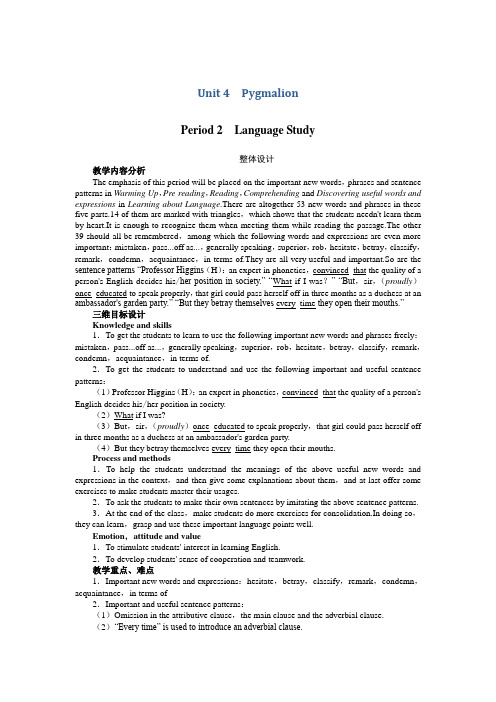
Unit 4PygmalionPeriod 2Language Study整体设计教学内容分析The emphasis of this period will be placed on the important new words,phrases and sentence patterns in Warming Up,Pre-reading,Reading,Comprehending and Discovering useful words and expressions in Learning about Language.There are altogether 53 new words and phrases in these five parts.14 of them are marked with triangles,which shows that the students needn't learn them by heart.It is enough to recognize them when meeting them while reading the passage.The other 39 should all be remembered,among which the following words and expressions are even more important:mistaken,pass...off as...,generally speaking,superior,rob,hesitate,betray,classify,remark,condemn,acquaintance,in terms of.They are all very useful and important.So are the sentence patterns “Professor Higgins(H):an expert in phonetics,convinced_that the quality of a person's English decides his/her position in society.” “What if I was?” “But,sir,(proudly)once_educated to speak properly,that girl could pass herself off in three months as a duchess at an ambassador's garden party.” “But they betray themselves every_time they open their mouths.”三维目标设计Knowledge and skills1.To get the students to learn to use the following important new words and phrases freely:mistaken,pass...off as...,generally speaking,superior,rob,hesitate,betray,classify,remark,condemn,acquaintance,in terms of.2.To get the students to understand and use the following important and useful sentence patterns:(1)Professor Higgins(H):an expert in phonetics,convinced_that the quality of a person's English decides his/her position in society.(2)What if I was?(3)But,sir,(proudly)once_educated to speak properly,that girl could pass herself off in three months as a duchess at an ambassador's garden party.(4)But they betray themselves every_time they open their mouths.Process and methods1.To help the students understand the meanings of the above useful new words and expressions in the context,and then give some explanations about them,and at last offer some exercises to make students master their usages.2.To ask the students to make their own sentences by imitating the above sentence patterns.3.At the end of the class,make students do more exercises for consolidation.In doing so,they can learn,grasp and use these important language points well.Emotion,attitude and value1.To stimulate students' interest in learning English.2.To develop students' sense of cooperation and teamwork.教学重点、难点1.Important new words and expressions:hesitate,betray,classify,remark,condemn,acquaintance,in terms of2.Important and useful sentence patterns:(1)Omission in the attributive clause,the main clause and the adverbial clause.(2)“Every time” is used to introduce an adverbial clause.3.Some difficult and long sentences in the text.教学过程Step 1Revision1.Check the homework exercises.2.Ask some students to tell something about the characters of the play.Step 2Reading and findingGet students to read through Warming Up,Pre-reading,Reading,Comprehending and Discovering useful words and expressions in Learning about Language to underline all the new words and useful expressions or collocations in these parts.Read them aloud and copy them down in the exercise book.Step 3Exercises for useful words and expressions1.Turn to Page 32.Go through Exercise 2 in Discovering useful words and expressions with students and make sure they know what to do.2.Ask them to finish the exercises within several minutes.First do them individually,and then discuss and check them with their partners.3.Check the answers with the whole class and explain the problems they might meet where necessary.Step 4Vocabulary studyⅠ.简单知识扫描(A级)1.mistaken(P29)【原句再现】There you are and you were born in Lisson Grove if I'm not mistaken.你呀,如果我没弄错的话,你出生于里森格罗佛。
人教版选修8 unit 4 PygmalionP2 Reading (共44张PPT)
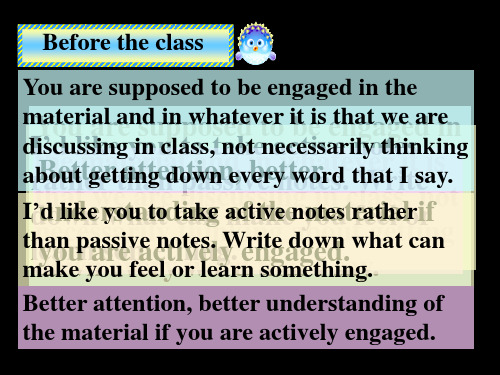
thief
9、要学生做的事,教职员躬亲共做;要学生学的知识,教职员躬亲共学;要学生守的规则,教职员躬亲共守。2021/8/252021/8/25Wednesday, August 25, 2021 10、阅读一切好书如同和过去最杰出的人谈话。2021/8/252021/8/252021/8/258/25/2021 1:22:52 AM 11、只有让学生不把全部时间都用在学习上,而留下许多自由支配的时间,他才能顺利地学习……(这)是教育过程的逻辑。2021/8/252021/8/252021/8/25Aug-2125-Aug-21 12、要记住,你不仅是教课的教师,也是学生的教育者,生活的导师和道德的引路人。2021/8/252021/8/252021/8/25Wednesday, August 25, 2021
because you are uncertain or nervous about it vi. 犹豫;踌躇 hesitate
to make a high sound by forcing air through
a small hole or passage, especially through
outcome
correctly, or in a satisfactory way
adv. 适当地;恰当地 properly
very unusual, special, unexpected or
strange adj. 不同寻常的;非凡的 extraordinary
to show feelings, thoughts or a particular
You have to believe in yourself. That's the secret of success. 人必须相信自己,这是成功的秘诀。
人教版高中英语选修8 Unit 4《Pygmalion》(period ⅱ)ppt课件

She had no hesitation in helping me with my English.=She helped me with my English without hesitation. 她毫不犹豫地帮我学习英语。
课堂讲练互动 中小学课件
(2013· 长春高二检测 )Please don't
课堂讲练互动 中小学课件
3.What if I was?(教材P29)如果我是 又怎样呢? What if...?如果是……又怎么样?这是 口语中的一种用法,相当于“What should you do if...?”,用来征求对方的意见或看 法,也可用于提出建议。 What if the rumor is true? 如果传闻是真的,又怎么样呢? What if your plan fails? 如果你的计划失败,你怎么办?
课堂讲练互动 中小学课件
●教学地位 单词和短语是构成句子的最小单位,在 语言学习中起着至关重要的作用,所以理 解和正确运用英语单词和短语是英语学习 的重点所在。
课堂讲练互动 中小学课件
●新课导入建议 We all know that the play plays an important part in the life of the people in England. Have you ever heard of Pygmalion and its writer,George Bernard Show? Now I will ask sb. to say something about them. (老师让某位同学 说说有关他们的事情)。
Patients are classified into three categories. 病人被归为三种类型。 Only eleven of these accidents were classified as major. 这些事故中只有11例被判定为重大事故。
新人教版高中英语选修8Unit4 Pygmalion教案

Unit 4 PygmalionTeaching aims:TopicTalking about the story PygmalionUseful words and expressions:Adaptation, plot, hesitate, uncomfortable, outcome, disguise, mistaken, brilliant, classify, betray, dismiss, dismissively, condemn, acquaintance, handful, fortune, upper, status, superior, pronunciation, antique, musical, mile, pence, professor, troublesome, pronounce, compromise, horrible, bathtub, sob, disgusting, overlook, alphabet, fade, classic, effective. Expressions: in disguise, pass…off as, make one’s acquaintance, in amazement, in terms of, generally speaking, show… in, the other day, take away, once more, in need of, fade out.3. Functional items:conjecture (推测)I wonder whether…Is it possible that…Do you know if…?Do you really think that’s true?Why do you think so?I think it’s because…What do you think of this idea?Why do you think Higgins felt like that?Mrs Pearce would comfort her by…4. GrammarRevise the Past Participle.The Titanic is a sunk ship in the ocean.The book intended as a surprise to him was lost in the mail.He seems moved to tears by the film.If bitten by a snake, you should call for help.We left them caught in the storm.Given more time, we could do it better.Frightened by the noise in the night, the girl did not dare sleep in her room. Disturbed by the noise, we had to finish the meeting early.Seen from the hill, the park looks more beautiful.She walked out of the house, followed by her little daughter.Teaching proceduresPeriod 1 ReadingStep 1. Warming upA. talk about Bernard Shaw and His play Pygmalion:Ask the students to discuss the questions:What do you know about Bernard Shaw, the author of Pygmalion?Do you know any of his works? Can you name some of them?B. Guide the Students to Finish the warming-up exercises on p28.Step 2. ReadingTask 1: Ss scan the play and answer the following questions:1. How many characters are there in the play?2. What’s the weather like when the play begins?3. Do you think Eliza a well-educated woman? Why?4. Why did professor Higgins want to make notes of what Eliza said?5. What’s the meaning of “the age of the newly rich”?Suggested answers:There are 3 characters in the play. They are Eliza, Professor Higgins, and Colonel Pickering.When the play begins, it is pouring with rain.No. She is poor-educated. We can know it from what she said and what she did. He wanted to make a speech, because it’s his profession.It means people begin their working life in a poor neighbourhood of London with 80 pounds a year and end in a rich one with 100 thousand.Task 2: Ask 3 students to read the play. One will be Eliza, one Professor Higgins, and one Colonel Pickering.Task 3: Listen to the play and finish Ex 1-5 on page 31-32.Period 2. Language learningStep 1. RevisionSs retell the act.Step 2. Language pointsAsk if the students have some difficulties in understanding the play. If so, make some explanation:I can place any spoken conversation within six miles, and even within two streets in London sometimes.我可以根据任何谈话来判断他们是哪个地方的人,差距不过六英里,有时侯在伦敦甚至不超过两个街区。
人教版高中英语选修八Unit4Pygmalion-Reading2课件新

Answerthefollowingquestions:
1DoyouthinkElizaisveryambitious? Yes,becauseshestilllikestolearnevenifHig ginstreatsherrudely. 2WhydidPickeringfancyhimself? Becausehecanpronouncetwentyfourdistinctvowelsounds.
高中英语课件
madeofcanruohanxing
Unit4Makingthebet (ActTwo)
ActTwo 主旨大意
1.ThistextismainlyaboutHenryHigginsandC olonelPickering_________aboutteachingE liza.
A.makingaconversation B.quarreling C.makingabet D.fighting
我很欣赏自己,因为我能发24个明显的元音, 但你能发130个音却击败了我。
fancy 1)vt.想像,设想 Wecannotfancyalifewithoutelectricity.
我们不能设想生活中没有电。
Shefanciedshesawsomeone,buttherewasno onethere.
那只是你的想像而已。
Ihaveafancyforfishing.
我只有钓鱼的爱好。
3.Thisisabitofluck.
这有点幸运。
abit;slightly;butnotvery;alittle
有点儿,稍微
Couldyouturndowntheradioabitplease?
你把收音机音量稍微调低点好吗?
人教版选修八Unit 4《Pygmalion》(第2课时 Reading)ppt课件

• b) n. • 1)[U] 居所;住处 • The refugees' main requirements are food and shelter. • 难民的主要必需品是食物和住所。 • 2)[U] ~ (from sth) 遮蔽,庇护,避难 ( 避雨、 躲避危险或攻击) • The rain sent everyone scurrying for shelter. • 这阵雨把大家浇得纷纷找地方躲避。
• Ⅱ.重点短语 • 1 . pass...________... ( 把某人 ) 改变或冒充 成…… • 2.make one's________ 结识;与……相见 • 3.________speaking 一般来说 • 4 . ________terms________... 就 …… 来说; 从……角度 • 5.try one's________ 碰运气 • 6.a________of 一把,少量 • 答 案 : 1.off as 2.acquaintance 3.generally 4.in; of 5.fortune 6.handful
• 7.________better than average • 8. ________to say publicy that you think someone or something is bad or wrong • 9.________the series of events which from the story of a novel, play, film, etc. • 答 案 : 1.caption 2.hesitate 3.mistaken 4.classify • 5 . remark 6.betray 7.superior 8.condemn 9.plot
高中人教版英语选修八-Unit-4--Pygmalion
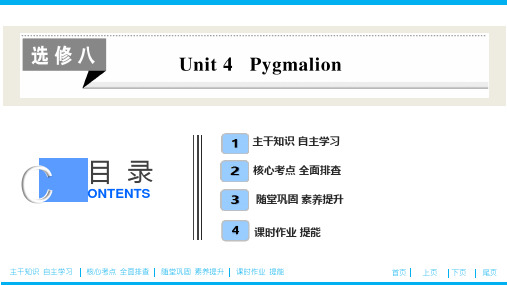
主干知识 自主学习 核心考点 全面排查 随堂巩固 素养主学习 核心考点 全面排查 随堂巩固 素养提升 课时作业 提能
首页 上页 下页 尾页
[课前三分钟] 朗.读.美.文.,.演.练.加.黑.部.分.的.句.式.
I feel honored to have a chance to introduce my favorite film to you. In my opinion, Harry Potter and the Goblet of Fire is the best film of all the series of the films about Harry Potter. In this film, Harry Potter is a fourth-grade student of Hogwarts School of Witchcraft and Wizardry (霍格沃茨魔法学校) and has become an excellent magician. Harry attends the exciting Tri-wizard Tournament (三强争霸赛) in which he receives many challenges. But to his great surprise,all these are just Voldemort's plot (伏地魔的阴谋).
主干知识 自主学习 核心考点 全面排查 随堂巩固 素养提升 课时作业 提能
首页 上页 下页 尾页
All the actors and actresses in the film perform very well. In a word, Harry Potter and the Goblet of Fire is well worth seeing.
高中英语 Unit 4 Pygmalion Pygmalion 2素材 新人教版选修8

PygmalionPygmalio n,King of Cyprus,was a famous sculptor.He made an ivory image of a woman so lovely that he fell in love with it.Every day he tried to make Galatea up in gold and purple,for that was the name he had given to this mistress of his heart.He embraced and kissed it,but it remained a statue.In despair he went to Aphrodite's shrine for help.Offering rich sacrifice and sendi ng up a passionate prayer,he begged the goddess to g ive him a wife as g raceful as Galatea.Back home,he went straight up to the statue.Even as he gazed at it a change came over it.A faint colour appeared on its cheeks,a gleam sho ne from its eyes and its lips opened into asweet smile.Pygmalion stood spee chless when Ualatea began to move towards him.She was simple and sweet and alive!Soon the roo m was ringing with her sliver voice.The work of his own hands became his wife.皮格马利翁塞浦路斯的国王皮格马利翁是一位有名的雕塑家。
英语全能人教版讲义选修8Unit4Pygmalion
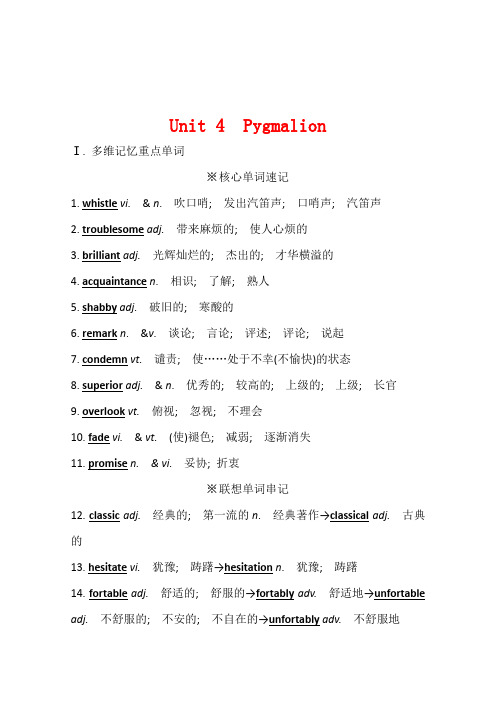
Unit 4 PygmalionⅠ. 多维记忆重点单词※核心单词速记1. whistle vi. & n. 吹口哨; 发出汽笛声; 口哨声; 汽笛声2. troublesome adj. 带来麻烦的; 使人心烦的3. brilliant adj. 光辉灿烂的; 杰出的; 才华横溢的4. acquaintance n. 相识; 了解; 熟人5. shabby adj. 破旧的; 寒酸的6. remark n. &v. 谈论; 言论; 评述; 评论; 说起7. condemn vt. 谴责; 使……处于不幸(不愉快)的状态8. superior adj. & n. 优秀的; 较高的; 上级的; 上级; 长官9. overlook vt. 俯视; 忽视; 不理会10. fade vi. & vt. (使)褪色; 减弱; 逐渐消失11. promise n. &vi. 妥协; 折衷※联想单词串记12. classic adj. 经典的; 第一流的n. 经典著作→classical adj. 古典的13. hesitate vi. 犹豫; 踌躇→hesitation n. 犹豫; 踌躇14. fortable adj. 舒适的; 舒服的→fortably adv. 舒适地→unfortable adj. 不舒服的; 不安的; 不自在的→unfortably adv. 不舒服地15. mistake n. &v. 错误; 误会→mistaken adj. (见解或判断上) 错误的; 不正确的16. fortune n. 机会; 运气; 大笔的钱→fortunate adj.幸运的→fortunately adv. 幸运地→unfortunately adv. 不幸运地17. horror n. 恐怖→horrible adj. 可怕的; 恐怖的18. proper adj. 适当的→properly adv. 适当地; 恰当地19. classify vt. 把……分类; 把……归类→classification n. 分类; 归类用所给词的适当形式填空1. He has a strong interest in classical (classic) Chinese literary works.2. Have your parents ever inspected your room to see if you cleaned it properly (proper)?3. I just heard the bank where Dora works was robbed (rob) by a gunman wearing a mask.4. Without hesitation(hesitate), he tried his best to save the drowning man.5. I couldn’t sleep because the bed was so unfortable (fort).6. I was late in getting to the station, but fortunately (fortune) for me the train was late, too.7. Yesterday her old mother mistook me for her daughter. That means I was mistaken for her daughter. In fact she often makes the same mistake. (mistake)8. At the hotel, I made the acquaintance (acquaint) of a young American actor.Ⅱ. 语境记忆重点短语1. pass. . . off as. . . (把某人)改变或冒充成……2. make one’s acquaintance结识; 与……相见3. in amazement震惊; 惊讶4. generally speaking一般来说5. in terms of. . . 就……来说; 从……角度6. rob sb. of sth. 抢劫某人某物7. show. . . in带或领……进来8. once more再一次9. in need of需要……10. fade out(声音、画面)逐渐模糊; 渐淡11. hold up支持住; 承受住; 举起; 抬起; 延迟; 阻碍12. in disguise伪装13. take down写下, 记录; 拆掉, 拆除14. hand over把……移交给……15. a handful of一把用以上短语的适当形式填空1. The job is great in terms of salary, but it has its disadvantages.2. He entered the hotel by passing himself off as a waiter.3. It was in London that I made the acquaintance of Jones, who was anelectrical engineer.4. My memory of the happy days we spent together will never fade out as time goes by.5. His jaw fell open, and he could only gape(目瞪口呆) in amazement at the incredible sight before him.6. Generally speaking, boys like active sports more than girls do.Ⅲ. 应用记忆经典句式1. While watching (当观看的时候), he makes notes. (状语从句的省略形式)2. Will that be of any use (有用处)to you? (“be of+抽象名词”表示“具有某种特征或属性的”)3. What if(要是……又会怎样)I was? (What if句式, 意为“若是……又会怎么样呢”)4. Henry Higgins and Colonel Pickering are sitting deep in conversation(深入谈话). (形容词短语作状语)5. But they betray themselves every time they open their mouths (每次他们一开口). (every time引导时间状语从句)6. I’d never have e if I’d known about(如果我知道……, 我永远也不会来……) this disgusting thing you want me to do. (if+had done, 主语+would have done表示对过去的虚拟)句式仿写1. 我在购物的时候, 遇到了我的一位老朋友。
人教版 高中英语选修8 Unit 4 Pygmalion Unit 4 Pygmalion Period 2
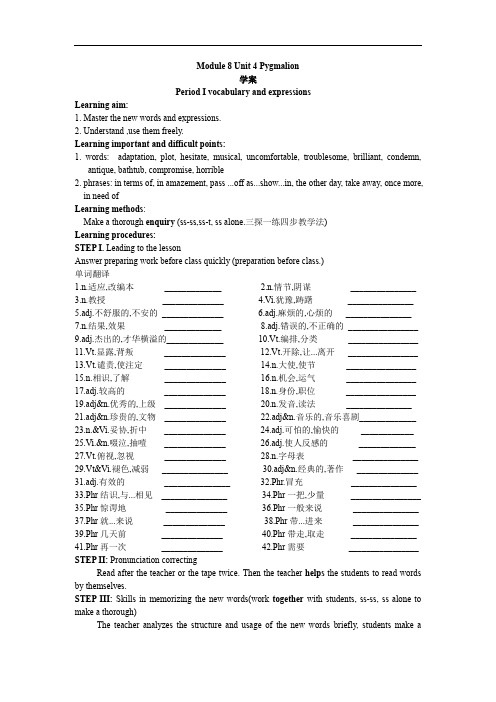
Module 8 Unit 4 Pygmalion学案Period I vocabulary and expressionsLearning aim:1. Master the new words and expressions.2. Understand ,use them freely.Learning important and difficult points:1. words: adaptation, plot, hesitate, musical, uncomfortable, troublesome, brilliant, condemn,antique, bathtub, compromise, horrible2. phrases: in terms of, in amazement, pass ...off as...show...in, the other day, take away, once more, in need ofLearning methods:Make a thorough enquiry (ss-ss,ss-t, ss alone.三探一练四步教学法)Learning procedures:STEP I. Leading to the lessonAnswer preparing work before class quickly (preparation before class.)单词翻译1.n.适应,改编本_____________2.n.情节,阴谋_______________3.n.教授______________4.Vi.犹豫,踌躇_______________5.adj.不舒服的,不安的______________6.adj.麻烦的,心烦的_______________7.n.结果,效果_____________8.adj.错误的,不正确的________________9.adj.杰出的,才华横溢的_____________ 10.Vt.编排,分类________________ 11.Vt.显露,背叛______________ 12.Vt.开除,让...离开________________ 13.Vt.谴责,使注定______________ 14.n.大使,使节________________ 15.n.相识,了解______________ 16.n.机会,运气________________ 17.adj.较高的______________ 18.n.身份,职位________________ 19.adj&n.优秀的,上级______________ 20.n.发音,读法_______________ 21.adj&n.珍贵的,文物______________ 22.adj&n.音乐的,音乐喜剧_____________ 23.n.&Vi.妥协,折中______________ 24.adj.可怕的,愉快的____________ 25.Vi.&n.啜泣,抽噎______________ 26.adj.使人反感的_____________ 27.Vt.俯视,忽视______________ 28.n.字母表_______________ 29.Vt&Vi.褪色,减弱_______________ 30.adj&n.经典的,著作______________ 31.adj.有效的_______________ 32.Phr.冒充_______________ 33.Phr结识,与...相见_______________ 34.Phr一把,少量________________ 35.Phr惊谔地______________ 36.Phr一般来说_______________ 37.Phr就...来说______________ 38.Phr带...进来_______________ 39.Phr几天前______________ 40.Phr带走,取走_______________ 41.Phr再一次______________ 42.Phr需要________________ STEP II: Pronunciation correctingRead after the teacher or the tape twice. Then the teacher helps the students to read words by themselves.STEP III:Skills in memorizing the new words(work together with students, ss-ss, ss alone to make a thorough)The teacher analyzes the structure and usage of the new words briefly, students make athorough enquiry1. In pairs either tells the story to your partner if you know it or work it out together. 【例证分析】work out 计算出【合作探究】You can ____________________ by _______________________.你把所有的数加在一起就能算出答案.See if __________________________________________.看看你能不能把这帐单算出来.work out还有以下意思:(1)详细拟订(计划,方案等),周密地想出;He ________________________________________________.他详细拟订了那项计划.(2)刻苦完成,巧妙处理;I _________________________________________________.我希望新工程顺利完成.(3)(口语中) Vi.结果成为…___________________________________________________?他的建议结果怎样?【思维拓展】work at从事于,在…上班work on致力于work up刺激,煽动work one’s way 费力前进,努力获得at work 在工作in work/ out of work 有职业/失业off work在休假的,未上班的set/put sb. to work 使(人)开始工作works of art___________________ a gas works__________________the works of a clock______________ public works_________________2. A gentleman passes and hesitates for a moment.【合作探究】hesitate vi.迟疑,踌躇,犹豫,感到迷惑_____________________________________________________________.她在拿起听筒前犹豫了一下.hesitate over/at/about 关于/做…犹豫不决She ________________________between __________________________.她犹豫不决,不能决定选两件裙子中的哪件.hesitate (about) wh… 是否做…犹豫不决_________________________________________________________.去巴黎要住在哪里,我们很少有拿不定主意的情况.hesitate to do… 迟疑于做…_________________________________________________________.如果你有什么要求请告诉我不要犹豫.【思维拓展】hesitation n.犹豫,踌躇hesitating adj.犹豫的hesitatingly adv.犹豫地for a moment 一会儿for the moment 暂时in a moment 一会儿at the moment 此时He will be here in a moment. 他一会儿就来。
2019学年度人教版选修八Unit 4Pygmalion Period 2Language pointsPPT课件(102张)
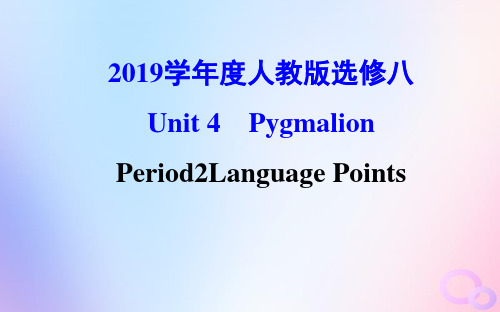
※He is still hesitating about whether to go for a holiday or not. 他还在犹豫是否去度假。
【自我归纳】
①hesitate to do sth.
_做__某__事__犹__豫__不__决__
②_h_e_si_t_a_te__a_b_o_u_t_(_d_o_in__g_)s_t_h_. 对 (做)某事犹豫不决
into two categories: practical and artistic. ( 编排; 分类; 归类 )
Ⅱ. 根据语境及根词写出正确的单词 1. I bought my son an _a_d_a_p_t_a_ti_o_n_ (adapt) for children of a play by Shakespeare. 2. In winter we wear _w_o_o_l_le_n_ (wool) clothes to keep us warm. 3. I told her my secret in the _m_i_s_ta_k_e_n_ (mistake) belief that I could trust her.
2 classify vt. 把……分类; 把……归类 ※The books in the library are classified by subject. 图书馆的书是按科目分类的。 ※Memory can be classified into short-term and long-term memory. 记忆可分为短期记忆和长期记忆。
Ⅲ. 补全下列短语
1. shelter _f_r_o_m_
躲避
2. take. . . _fo_r_. . .
人教版高中英语选修八《Unit 4 Pygmalion》Using Language 课件 2
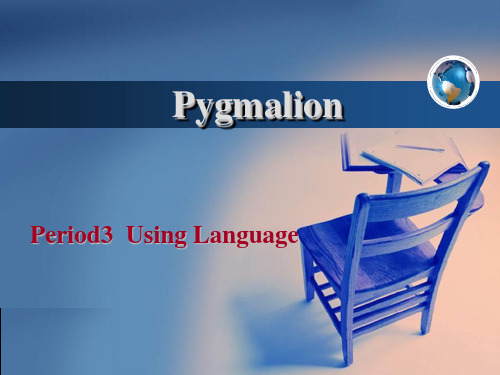
I think it’s because… Do you think Higgins felt like that? How did Eliza feel about her first lesson? what do you think would make Eliza happier? Mrs. Pearce would comfort / encourage her by….. Why do you think so?
人教版英语选修8 Unit4 Pygmalion--Period2
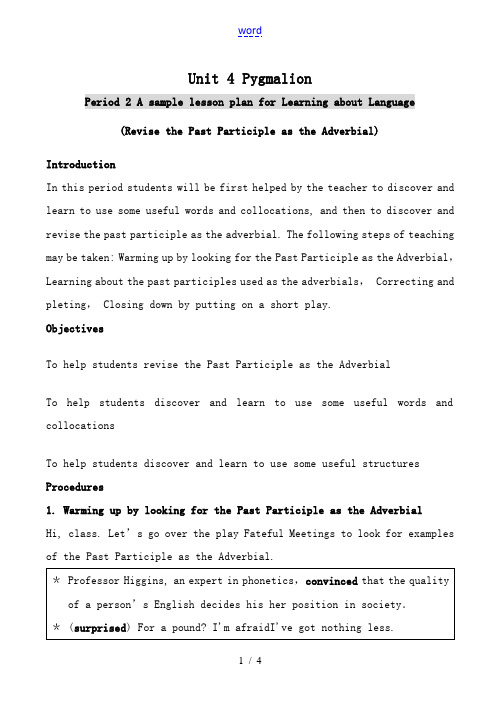
Unit 4 PygmalionPeriod 2 A sample lesson plan for Learning about Language(Revise the Past Participle as the Adverbial)IntroductionIn this period students will be first helped by the teacher to discover and learn to use some useful words and collocations, and then to discover and revise the past participle as the adverbial. The following steps of teaching may be taken: Warming up by looking for the Past Participle as the Adverbial,Learning about the past participles used as the adverbials, Correcting and pleting, Closing down by putting on a short play.ObjectivesTo help students revise the Past Participle as the AdverbialTo help students discover and learn to use some useful words and collocationsTo help students discover and learn to use some useful structures Procedures1. Warming up by looking for the Past Participle as the AdverbialHi, class. Let’s go over the play Fateful Meetings to look for examples of the Past Participle as the Adverbial.2. Learning about the past participles used as the adverbialsThe past participles are sometimes used as the adverbials. Look at the following examples:* We went home exhausted (疲惫地). (逻辑主语we, 过去分词exhausted)* Encouraged by my teacher, I decided to work hard. (逻辑主语 I,过去分词encouraged)* Granted that he has enough money to buy the house, it doesn't mean he's going to do so.* Told by the teacher, she knew she was wrong. (分词 told 用过去式分词表示被动)* Now you are going to read the text for more examples of the past participles used as the adverbials.3. Correcting and pletingNow you shall go on to do exercises 2 and 3 on page 33.First you are to read the 5 sentences and correct any mistakes in them. Check with a partner.Then read the unpleted passage and plete it with suitable words, in the form of either the present or past participle.4. Closing down by putting on a short playTo end this period we are going to put on a short play.Hamlet and the Heckler (a very short play)Hamlet: To be or not to be...Heckler: I knew it. I knew he was going to say that.Hamlet: that is the question...Heckler: He's going to say the rest of it, too.Hamlet (to Heckler): Excuse me, do you mind?Heckler: I didn't know he was going to say THAT.Hamlet: I'm just trying do my job here.Heckler: Yeah, but do you have to do it the same way every time? Hamlet: Well, this IS Shakespeare you know.Heckler: Ooooo, Shakespeare. Why don't you do Shakespeare with modern language?Hamlet: Shakespeare wrote it perfect the way it is. We can't change it. Heckler: Why not? Just change "To be or not to be..." into whatever the hell it means. [pause] By the way, what does it mean?Hamlet: Well, he's considering suicide. He's considering which might be better, living or dying, being or not being. Changing it would sound stupid, wouldn't it? It wouldn't be memorable.Heckler: But the audience would understand it, for a change.Hamlet:But people do understand Shakespeare, at least most of it. And they figure out the rest from the context.Heckler: I'll bet the audience didn't know what "To be or not to be" means from the context.Hamlet: Then how would you say it?Heckler:How should I know? I'm just a heckler.Hamlet: Then why don't you just shut the hell up?Heckler: Not bad, was that Shakespeare? [curtain]。
2019学年度人教版选修八Unit4 PygmalionPeriod2Language points学案(6页word版)
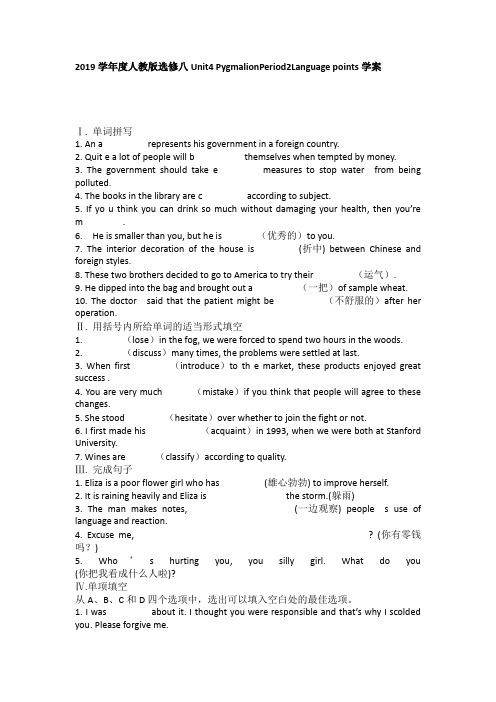
2019学年度人教版选修八Unit4 PygmalionPeriod2Language points学案Ⅰ. 单词拼写1. An a represents his government in a foreign country.2. Quit e a lot of people will b themselves when tempted by money.3. The government should take e measures to stop water from being polluted.4. The books in the library are c according to subject.5. If yo u think you can drink so much without damaging your health, then you’re m .6. He is smaller than you, but he is (优秀的)to you.7. The interior decoration of the house is (折中) between Chinese and foreign styles.8. These two brothers decided to go to America to try their (运气).9. He dipped into the bag and brought out a (一把)of sample wheat.10. The doctor said that the patient might be (不舒服的)after her operation.Ⅱ. 用括号内所给单词的适当形式填空1. (lose)in the fog, we were forced to spend two hours in the woods.2. (discuss)many times, the problems were settled at last.3. When first (introduce)to th e market, these products enjoyed great success .4. You are very much (mistake)if you think that people will agree to these changes.5. She stood (hesitate)over whether to join the fight or not.6. I first made his (acquaint)in 1993, when we were both at Stanford University.7. Wines are (classify)according to quality.Ⅲ. 完成句子1. Eliza is a poor flower girl who has (雄心勃勃) to improve herself.2. It is raining heavily and Eliza is the storm.(躲雨)3. The man makes notes, (一边观察) people s use of language and reaction.4. Excuse me, ? (你有零钱吗?)5. Who’s hurting you, you silly girl. What do you (你把我看成什么人啦)?Ⅳ.单项填空从A、B、C和D四个选项中,选出可以填入空白处的最佳选项。
最新-2021学年高二年级英语新选修8课件:Unit 4Pygmalionsection 2 精品

• 不管你什么时候去看他,他都在用功。
• ②You may come whenever/no matter when you please.
• 你什么时候愿意来就什么时候来。
• 知识拓展
• 类似引导让步状语从句的词除了whenever外, 还有however,wherever,whatever, whoever,whichever等,相当于“no matter +疑问词”。“疑问词+ever”除了可引导让 步状语从句外,有时还可引导名词性从句, 而“no matter+疑问词”只能引导让步状语 从句。
• I don't like the way he speaks.
• =I don't like the way that he speaks.
• =I don't like the way in which he speaks.
• 活学活用 • 补全句子 • 使我惊奇的不是他的话而是他说话的方式。
• 活学活用
• (1)选词填空(in turn/in return)
• (真题改编·浙江)While staying in the village, James unselfishly shared whatever he had with the villagers without asking for anything ________.
- 1、下载文档前请自行甄别文档内容的完整性,平台不提供额外的编辑、内容补充、找答案等附加服务。
- 2、"仅部分预览"的文档,不可在线预览部分如存在完整性等问题,可反馈申请退款(可完整预览的文档不适用该条件!)。
- 3、如文档侵犯您的权益,请联系客服反馈,我们会尽快为您处理(人工客服工作时间:9:00-18:30)。
Unit 4 Pygmalion
Period 2 A sample lesson plan for Learning about Language
(Revise the Past Participle as the Adverbial)
Introduction
In this period students will be first helped by the teacher to discover and learn to use some useful words and collocations, and then to discover and revise the past participle as the adverbial. The following steps of teaching may be taken: Warming up by looking for the Past Participle as the Adverbial,Learning about the past participles used as the adverbials, Correcting and completing, Closing down by putting on a short play.
Objectives
To help students revise the Past Participle as the Adverbial
To help students discover and learn to use some useful words and collocations
To help students discover and learn to use some useful structures Procedures
1. Warming up by looking for the Past Participle as the Adverbial
Hi, class. Let’s go over the play Fateful Meetings to look for examples of the Past Participle as the Adverbial.
2. Learning about the past participles used as the adverbials
The past participles are sometimes used as the adverbials. Look at the following examples:
* We went home exhausted (疲惫地). (逻辑主语we, 过去分词exhausted)
* Encouraged by my teacher, I decided to work hard. (逻辑主语 I,过去分词encouraged)
* Granted that he has enough money to buy the house, it doesn't mean he's going to do so.
* Told by the teacher, she knew she was wrong. (分词 told 用过去式分词表示被动)
* Now you are going to read the text for more examples of the past participles used as the adverbials.
3. Correcting and completing
Now you shall go on to do exercises 2 and 3 on page 33.
First you are to read the 5 sentences and correct any mistakes in them. Check with a partner.
Then read the uncompleted passage and complete it with suitable words, in the form of either the present or past participle.
4. Closing down by putting on a short play
To end this period we are going to put on a short play.
Hamlet and the Heckler (a very short play)
Hamlet: To be or not to be...
Heckler: I knew it. I knew he was going to say that.
Hamlet: that is the question...
Heckler: He's going to say the rest of it, too.
Hamlet (to Heckler): Excuse me, do you mind?
Heckler: I didn't know he was going to say THAT.
Hamlet: I'm just trying do my job here.
Heckler: Yeah, but do you have to do it the same way every time? Hamlet: Well, this IS Shakespeare you know.
Heckler: Ooooo, Shakespeare. Why don't you do Shakespeare with modern language?
Hamlet: Shakespeare wrote it perfect the way it is. We can't change it. Heckler: Why not? Just change "To be or not to be..." into whatever the hell it means. [pause] By the way, what does it mean?
Hamlet: Well, he's considering suicide. He's considering which might be better, living or dying, being or not being. Changing it would sound stupid, wouldn't it? It wouldn't be memorable.
Heckler: But the audience would understand it, for a change.
Hamlet:But people do understand Shakespeare, at least most of it. And they figure out the rest from the context.
Heckler: I'll bet the audience didn't know what "To be or not to be" means from the context.
Hamlet: Then how would you say it?
Heckler: How should I know? I'm just a heckler.
Hamlet: Then why don't you just shut the hell up?
Heckler: Not bad, was that Shakespeare? [curtain]。
